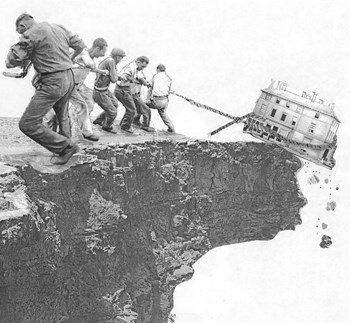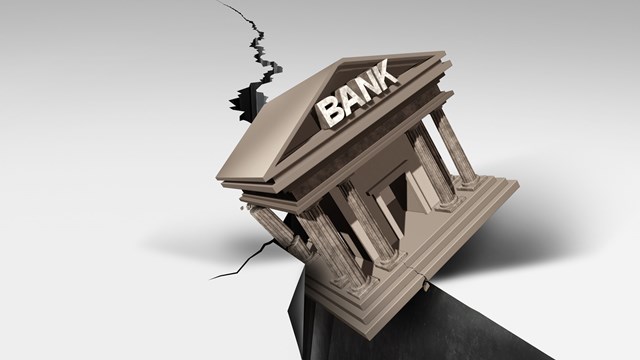
It happens infrequently, but when it does, it can be an enormous challenge: a co-op corporation or condo development has a long-running squabble with the building sponsor/developer, falls victim to long-term mishandling of funds – or outright fraud - by the board, or has to undertake a major unexpected or ill-prepared-for repair project. All of a sudden, they’ve got no money in the reserve fund, they can’t borrow against the property to make vital repairs, and residents are beginning to think they may have made a poor investment. Suddenly the whole building is on the precipice of insolvency. It’s a scary situation – but there are ways to edge back from the brink of financial wreck and ruin, however, and get back on track. Here are some stories of communities who did just that.
Running the Numbers
At the end of the day, keeping a building solvent is about math. The money coming in has to be greater than or equal to the money going out. Extreme variation in either of the two sides of the equation can push a building towards financial difficulty. There are any number of ways, sudden or gradual, that this can come about.
The first reason is simple mismanagement. “Where communities fall into problems is when they don’t pay attention to what their building needs,” explains Enid Hamelin, longtime property manager and current board member at the Butterfield, a co-op in Manhattan. “They have no concept of the preservation of the structure of the building. They have not planned for it.” For example, there are a number of prewar buildings in New York, built during the Roaring Twenties. These are often coveted addresses, with their oversized apartments, high ceilings, interesting features, and so forth. But they are old. And with age comes the need for renovation. So it’s especially important in that type of building to be vigilant and plan carefully.
“There’s some instances when you see it,” says Jeffrey Reich, a partner with Manhattan-based law firm Schwartz Sladkus Reich Greenberg Atlas LLP. “Boards aren’t watching the store. They hold common charges and maintenance down and don’t let them grow with expenses, or maybe cover it with a flip tax or some other income they get. They’re not keeping up, and they’re in a hole. There can be some slow burns.”
Another way co-ops and condos get into trouble: unforeseen expenses. Out of nowhere, a building that has been in the black suddenly finds itself in urgent need of funds. Maybe the roof has deteriorated years before anyone thought it would. Maybe the elevators stop working. “Local Law work—that’s another one,” Reich says. “You have to replace a roof or do a million dollars’ worth of façade work.”
Or it could be something even worse. “Loss of a lawsuit, or something of that nature,” says Reich. “If not covered by insurance, that could be a problem.” Another issue is an act of God, not covered by insurance. New York experienced this with Hurricane Sandy back in 2012. “A number of buildings during Sandy got damage that wasn’t covered by their insurance,” Reich recalls, “or took longer to get paid than they were expecting.”
Reich says the bigger culprits in sudden financial crisis for residential communities are these types of catastrophic events: “A Sandy, a fire, a lawsuit.” When these events happen, boards react by doing what is necessary to raise the funds, either through assessments, tapping into capital improvement savings, or securing a new loan from a lender.
“Usually you’re dealing with a situation where they are financially distressed and physically distressed,” says Paul Santoriello, president of Taylor Management in New Jersey. “You have a need and you don’t have the means to address it.”
Slow Starvation
It’s not hard to see how a four-alarm fire or 100-year storm could financially decimate a co-op or condo financially. The more insidious problem, however, and one that’s just as dangerous is not when there are unforeseen expenses, but when the revenue begins to dry up. “The bigger way they get into trouble is when the owners fail to make payments,” Reich says. “We saw it in 2008 and 2010.” Because of ripple effects from the Great Recession, owners and shareholders failed to make payments. If enough owners are in hot water, unable to pony up for maintenance and other common charges, says Reich, “That’s all she wrote.”
Exacerbating the problem is the administrative structure of co-ops. When residential co-ops were first formed, large investors—the ‘sponsors,’—bought up blocks of apartments in certain buildings. According to Hamelin, if buildings were in trouble, and sponsors found themselves short of funds, suddenly what seemed like a stable investment property was no longer so stable. This is what happened to some buildings in 2008, after the fall of Lehman Brothers.
But, says Reich, co-ops have distinct advantages over condos in a downturn. First and foremost, co-ops have the first lien on the building, meaning the co-op gets paid before the bank, should a shareholder default and be foreclosed upon. “If there’s a foreclosure, the co-op collects,” he explains. “It is in the lender’s interests to pay the co-op, in order to secure the collateral. In condos, the opposite is true. The bank comes first.” Not only that, but the process of foreclosure in New York State can take up to two years. “All that time, the condo isn’t collecting maintenance.”
In this case, the buildings less at-risk are obviously those whose shareholders and owners have higher net worth. These buildings “aren’t as susceptible, because you have more room for margin for error,” Reich explains. If the board calls for an assessment—even a steep one - they are more likely to collect from a rich building than a middle-class one. He recalls a building in Brooklyn hit particularly hard during the last downturn, where 20 percent of the units were in arrears.
That these failures are not sudden doesn’t make them any easier to manage. It’s like waiting for a tsunami to hit. “When the shareholders or co-op owners aren’t paying, there’s usually a lead time,” Reich says. “We have two units in arrears, then we have 5%, then 10%, then it’s 20%.” The next thing you know, the boat is sinking.
Co-ops go insolvent very rarely; condos fail more frequently, but still not often – and insolvent condo associations are more concentrated in markets like Florida than New York or New Jersey. But just because financial collapse is rare, it definitely does happen. “A co-op could be foreclosed on by its lender,” Reich says. “If the co-op can’t meet expenses, banks will come in, and they could foreclose. If that happens, the individual shareholders remain liable for their share loans.” In short, they would be in debt, but without the ownership of the asset—an undesirable position indeed.
Steady As She Goes
So how do co-ops and condos in dire financial straits right the ship? “It’s like anything else,” Reich says. “The first step is admitting you have a problem.”
From there comes an honest assessment of the underlying causes. “A board has to get arms around income and expenses,” Reich says. “If income is not being collected, they have to take necessary measures to get residents in arrears to pay. Pursue collection. Foreclosure, lawsuit, notifying lenders. [Boards] have to aggressively attack income issues. Try to cut costs. See what they can do to recapitalize, that is refinance.”
Accounting and planning is critical. “Put together a financial plan,” Santoriello says. “Part of that is creating the cash that will be used to address the physical needs of the building.” Many HOAs are securing loans from banks, more so than ever before, because the rates are favorable, and banks find condo associations to be good investments. “It’s similar to a municipality,” he says.
Then it’s all about instituting best practices, to make sure a bad situation doesn’t recur.
“All buildings should have a reserve fund,” Hamelin says. “There are a number of ways to build one up. A lot of buildings have created flip taxes, buyers’ taxes. When a buyer buys into the building they have to pay 1-2% of the sale price as a fee to the co-op. On a million dollar apartment, you have a bundle of money that can go into the reserve fund.” Tax rebates received by the buildings can be squirreled away into the reserve fund as well, rather than distributed to the owners—a sort of preemptive assessment.
“You have to be able to plan ahead,” Hamelin says. “You have to look objectively in the building and plan for what it needs. Does it need new elevators? How long will the elevators last? Do you need a new roof?”
Knowledge of the building is also critical. “Walk the building,” Hamelin advises. “Walk the roof. Ask about the pipes. Find out how much the average employee gets paid. The hallways, the elevators, the security system, the laundry room. You have to know what your product is before you make any judgments. You can do this in a couple of hours. An education you don’t get it if you just meet once a month.” And even this might not alone solve all problems down the line. “Any building can step into tar,” Hamelin says. “Really. It’s just one of those things.”
“Taking those measures, buildings turn around,” says Reich. “How long does it take? Depends on how deep a problem it is. It could take years.”
Santoriello agrees. “To dig out of a hole will take time.”
Greg Olear is a published novelist and a regular contributor to The Cooperator.






Leave a Comment